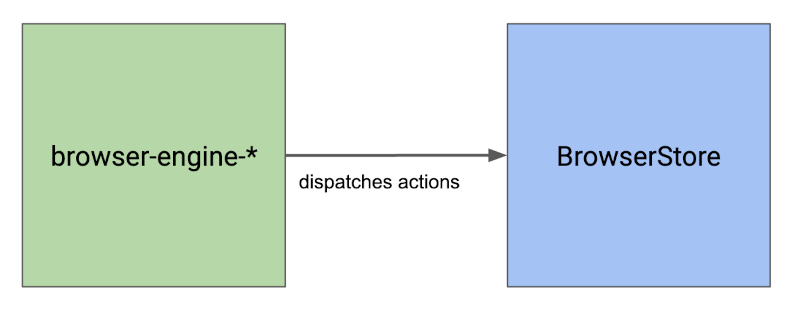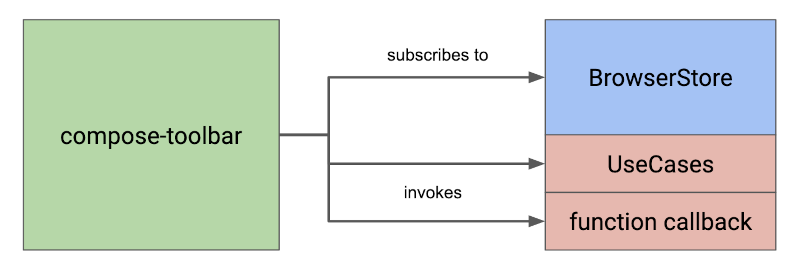⏭️ After the browser-state migration - what's next?
After 2+ years slowly and incrementally working towards this goal, we completed the migration from the browser-session component to the browser-state component for state handling. Finally, we were able to delete browser-session and all state is now maintained and updated by the redux-like BrowserStore.
The following blog posting describes some of the possible follow-up changes to the architecture that we would consider, depending on the outcome of further discussions and prototyping.
Reversing the dependency between browser-state and browser-engine implementations
In the current architecture every browser-engine implements concept-engine and exposes an abstracted mechanism for observing events. For every EngineSession an EngineObserver gets created, which will dispatch a BrowserAction for every event, updating the centralized state.

Now that the migration to browser-state is completed, we can reverse this dependency. With a browser-engine implementation depending on browser-state directly, it can dispatch actions without an observer in between.

This removes the requirement for a shared, abstracted observer interface in concept-engine. It would no longer be required to have shared “glue code” for connecting an abstract browser engine with the state handling component.
A potential downside to this approach is that the BrowserStore and related BrowserActions become the new “interface” that a browser engine has to dispatch correctly, which can be harder to understand and follow than simply implementing actual interfaces.
Overall this seems to be worthwhile exploring and potentially discussing further in an RFC.
Jetpack Compose
Android’s new UI toolkit, Jetpack Compose, will significantly change how we build user-facing features in components and apps.
The good news is that Jetpack Compose works very nicely with our browser-state component. In Android Components we will provide bindings that allow subscribing to any lib-state baked Store, causing a recomposition if the observed state changes.
@Composable
fun SimpleToolbar(
store: BrowserStore
) {
// Subscribe to the URL of the selected tab
val url = store.observeAsState { state -> state.selectedTab?.content?.url }
// Will automatically get recomposed if the URL changes
Text(url.value ?: "")
}
Observing specific tabs
Today we have many components that optionally take a nullable tabId: String? parameter. If a tab ID is provided then the component is supposed to observe this specific tab. And if the parameter is null then the component will automatically track the currently selected tab. This has caused issues in the past when a null value was provided accidentally, causing the wrong tab to be tracked. With Jetpack Compose we want to make this more explicit and will provide a Target class, that lets the caller explicily define what tab should be targeted. In addition to that this allows us to provide extension functions for easily observing this tab.
@Composable
fun Example(store: BrowserStore) {
// Explicitly observe specific tabs
SimpleToolbar(store, Target.SelectedTab)
SimpleToolbar(store, Target.Tab("tabId"))
SimpleToolbar(store, Target.CustomTab("customTabId"))
}
@Composable
fun SimpleToolbar(
store: BrowserStore,
target: Target
) {
// Observe the URL of the target. Only when the URL changes, this will
// cause a recomposition. Other changes of the tab get ignored.
val tab: SessionState? by target.observeAsStateFrom(
store = store,
observe = { tab -> tab?.content?.url }
)
Text(tab?.content?.url ?: "")
}
Observing state directly vs concept components
A central piece of our current component architecture is splitting the implementation into three pieces: A concept component, an implementation, and a glue/feature component for integration. This allows us to easily swap (concept) implementations, without having to change any other code. The downside of this approach is that all implementations need to abide by the interface abstractions.
Let’s look at the toolbar component as an example.

concept-toolbarcontains the interface and data classes to describe a toolbar and how other components can interact with it.browser-toolbaris an implementation of concept-toolbar.feature-toolbarcontains the glue code, subscribing to state updates in order to update a toolbar (presenter), and reacting to toolbar events in order to invoke use cases (interactor).
Using the two concepts above, reversing the dependency and using Jetpack Compose, we can simplify this architecture and reduce it to a single component. A (UI) component written in Jetpack Compose can directly observe BrowserStore for state updates and delegate events to a function callback parameter or UseCase class directly.

Differently scoped states
Our browser applications maintain state adhering to three different scopes: browser state, screen state and app state.
Browser State
“Browser State” is the state the browser is in (e.g. “which tabs are open?”) and the state that is shared with our Android Components. It’s available through the browser-state component to other components and the application.
With the bindings mentioned above, browser-state works well with Jetpack Compose.
Screen State
“Screen State” is the state for the currently displayed screen (e.g. “what text is the user entering on the search screen?”). In Firefox for Android, we are using lib-state backed stores for each screen (e.g. SearchFragmentStore).
As for browser-state above, with the Jetpack Compose bindings for every lib-state implementation, we can continue to use our existing screen-scoped stores.
Alternatives, used by the Android community, are ViewModels using LiveData or StateFlow. Or, at a lower level, Jetpack Compose idioms like rememberSaveable().
Currently we do not offer bindings in lib-state for saving and restoring state to survive activity or process recreation. This is something we could add (based on Saver), specifically for scoped stores.
val store = scopedSaveableStore<BrowserScreenState, BrowserScreenAction> { restoredState ->
BrowserScreenStore(restoredState ?: BrowserScreenState())
}
App State
“App state” is the state the app is in, independently from the currently displayed screen (e.g. “Is the app in light or dark mode?”).
Currently in Fenix there’s no centralized app state. For some parts there are manager singletons (e.g. ThemeManager) or the state is read from SharedPreferences.
We could try using an global app store and the same patterns we use for the browser store and the screen scoped stores. That’s something we are currently trying in Focus (AppStore). In fact, in Focus, the screen scoped state is a sub state of the application-wide state (Screen state).
Stateless composables
With Jetpack Compose it is preferred to write stateless composables (State hoisting). This means that state is passed down as function parameters and events are passed up by invoking functions. Listening to the store and dispatching actions sidesteps this mechanism. Only subscribing to state changes at the top layer and passing everything down/up is cumbersome and may introduce a lot of duplicated “glue” code across our projects.
Let’s look at a simplified example of a browser toolbar. There are two options:
Example A: All state (e.g. the URL to display) gets passed down to the toolbar:
@Composable
fun Toolbar(
url: String
) {
Text(url)
}
Example B: The toolbar subscribes to state it needs itself.
@Composable
fun Toolbar(
store: BrowserStore
) {
val url = store.observeAsState { state -> state.selectedTab?.content?.url }
Text(url.value ?: "")
}
The code from example A is the most reusable. The app is in full control of what state gets displayed. But this also introduces duplicate code across apps (for getting the state and passing it down) and makes it more likely to introduce bugs (security and spoofing). Example B is guaranteed to be consistent across apps. But the composable is strictly tied to the state and how it gets observed.
When writing (UI) components using Jetpack Compose, we will have to find the right balance between the two patterns.
In the best case the composition of composables make both patterns possible, depending on the needs of the component consumer:
@Composable
fun Toolbar(
store: BrowserStore
) {
val url = store.observeAsState { state -> state.selectedTab?.content?.url }
Toolbar(url.value ?: "")
}
@Composable
fun Toolbar(
url: String
) {
Text(url)
}